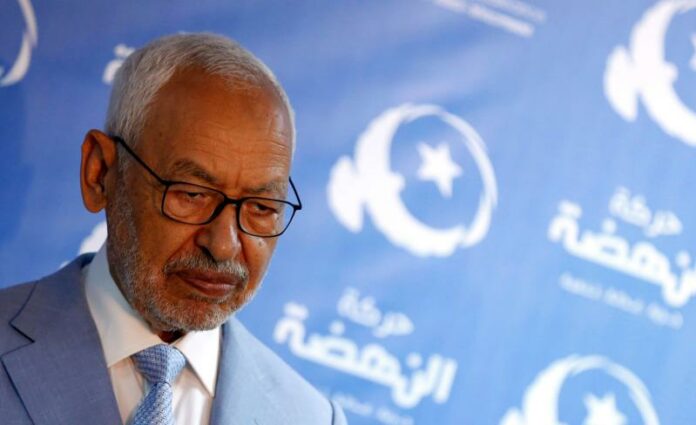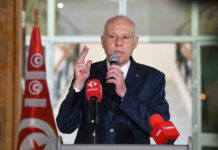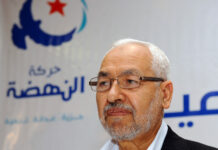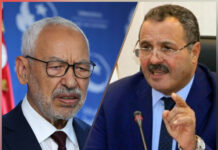Ennahda Movement is facing a difficult situation after a militant from the movement (Sami Sifi) set himself on fire at its headquarters, which reminds us of the atmosphere of protest against the late President Zine El Abidine Ben Ali in 2010, but this time the anger was directed against the movement’s leader Rached Ghannouchi, whom the movement’s activists hold responsible for the disintegration of the Ennahda Party and the deterioration of the political situation in the country.
To get out of the internal crisis that is pressuring him, Ghannouchi decided to escalate the relationship with President Kais Saied.
One of the activists said, “God forgive those who refused to meet the late leader of the movement. If the issue of his dismissal from his job as a guard for the headquarters is correct, it will be a scandal and a disgrace in the history of the movement, especially since he spent his youth in prison because of the Bab Souika incident.”
Another activist, during a statement on the page of Abdellatif Mekki, one of the Movement’s resigned leaders, indicated that “the Ennahda movement disavows one of its supporters when he asked to meet a leader, but he was rejected, ridiculed and insulted, so he rose up from this injustice and set himself on fire on the first floor.”
While some activists called for appeasement and waiting for the official investigation to find out the story that led to Sami Sifi’s suicide, a general trend among activists considered that the suicide incident was the result of the Movement’s leaders’ wrong policies which focused on the conflict of powers and leaving everything behind, such as its members’ conditions, especially those who went victim its policies during the 1990s.
These activists said that it is no longer important now whether the conference takes place or not, and that the priority is to prepare for the rise of a new leadership that is not linked to Ghannouchi and does not fall under his control, pointing out that Ghannouchi’s withdrawal from the leadership is necessary before talking about reforms or leadership changes, and this is what must happen before the conference, warning that linking the changes to the date of the conference may perpetuate the crisis, especially that the movement’s leader will resort, as usual, to maneuvers to postpone this partisan occasion and gain time.
Circles close to the Ennahda movement believe that Ghannouchi will seek to focus on the topic of the conference and threaten to withdraw and not make any legal changes that would allow him to renew for another session. The goal here is to absorb the state of anger that pervades the Movement’s body on the suicide incident, which may develop with time to lead to an explosion of the movement from within and hit the movement’s identity to the core.
Hedi Brik, an Islamist living abroad, said that “the suicide of one of the movement’s militants is a dangerous precedent,” adding, in a post on his Facebook account, that it is a precedent of “heavy value weight. It represents a heavy blow to the movement’s identity, and that every effort to ignore or belittle it is not befitting an Islamic movement.”
For his part, Abdellatif Mekki, who leads the resigned party, considered that Ghannouchi’s statements (in which he justified the suicide of an Ennahda member and blamed the state) were unsuccessful, to say the least!
On Saturday, Ghannouchi returned to the same accusation when he considered in the statement that Sifi’s suicide was “the result of the crime of a tyrannical state that violated the rights of some of its citizens before the revolution and granted them rights within the transitional justice process that they did not adhere to.”
Activists on social media had warned of the dangers of Ghannouchi’s attempt to hold the state responsible for the suicide of a victim of his decades-old adventures and struggles. He uses them in his clear political game instead of compensating them for the violence they provided in favor of the movement (attacks on security agents and state institutions and carrying out acts of violence, including burning the headquarters of the former ruling party in the Bab Souika area in the center of the capital, Tunis).
In order to get out of the internal crisis that is now pressuring him, Ghannouchi decided to escalate the relationship with President Kais Saied, and to return to the data box that only he has mastered.
In a statement, Ennahda warned “of the dangers of repealing the constitution and exclusion,” and of “the tendency towards unilateral engineering of Tunisia’s political and legal system.” It also warned against compromising the constitutional structure of the authority by means of decrees, and hence bringing the government into an open crisis of legitimacy, with very bad consequences for political stability and the future of the country.
It seems that Ghannouchi found the appropriate opportunity to escalate with Kais Saied, especially after the ambassadors of the G7 member states accredited in Tunisia called on Friday for a “quick” return to the work of “democratic institutions” in the country.
“We reiterate the importance of respecting the fundamental freedoms of all Tunisians and the importance of the inclusiveness and transparency of the process of involving whoever concerned, including the different voices in the political spectrum and civil society, with a clear time limit that allows for a rapid return to the functioning of democratic institutions, including an elected parliament that plays an important role,” as said in the movement statement.











